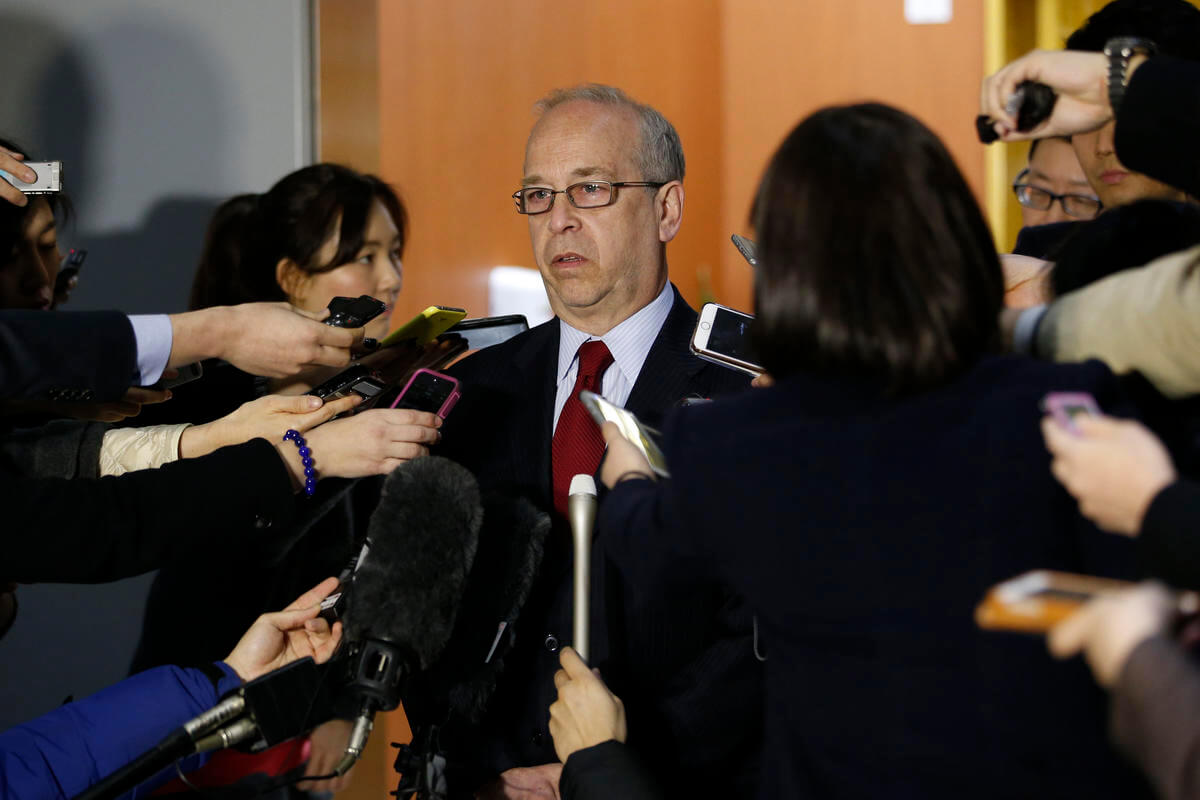Media Report

- The Associated Press reports: "The United States reserves the right to punish Chinese companies that violate U.N. sanctions on North Korea if Chinese authorities don't take action, a senior U.S. official said Wednesday. Top U.S. diplomat for East Asia, Daniel Russel, said that since most of North Korea's illegal activities are conducted through neighboring China, companies are 'going to have to tighten up and shut down operations.'...'To the extent that the Chinese authorities themselves take action against North Korea malefactors or Chinese companies that are collaborating with North Korea then there's no cause for action by the United States or others,' Russel told reporters....Russel said while there's 'frustration and differences of view' between Washington and Beijing, they do cooperate on North Korea. The U.S. is constantly 'scanning the horizon' for evidence of sanctions violations and makes a point of sharing with China first any information they have about 'bad actors' there, he said."
- BBC News reports: "China's annual rich list has indicated that, once again, the country has more dollar billionaires than the US, and the gap is widening. Property magnate Wang Jianlin of Dalian Wanda tops the list of 594 billionaires in the country, ahead of 535 billionaires in the US. Alibaba's Jack Ma was second, with his wealth having risen 41% from last year. The annual list is compiled by Shanghai publishers Hurun and often compared to the Forbes list in the US. The Hurun Report's rich list is one of the most closely-watched and accurate assessments of wealth in China. The annual report has been published for the past 18 years. Earlier this year, the publisher released a separate, global list, showing that the number of billionaires in China outnumbered those in the US for the first time. However, none of China's super-rich make it into the global top 20."
- The Washington Post: WorldViews comments: "Censorship, U.S. Supreme Court Justice Potter Stewart once observed, 'reflects a society's lack of confidence in itself.' This week, the Chinese government's lack of confidence was on display as reports emerged that a state-run bookstore in Shanghai had opened the plastic wrapping around a batch of Merriam-Webster's English dictionaries and had torn out the page containing a definition of Taiwan....In 2009, complaints emerged online because dictionary entries for Taipei, Taiwan, Taiwanese, Formosa, China and Republic of, had all been blacked out by marker pens....An employee with the Beijing Foreign Languages Bookstore told The Washington Post that all imported copies of the Merriam-Webster dictionary had been 'treated' before they went on the shelf. 'There is content violating the One China principle, and we have dealt with it in accordance with relevant regulations,' he said, only giving his surname as Zhu. 'It's a company decision. If our customers ask, we will give them the same explanation.'"
Calendar
- 2016-10-12 Russia Says It’s Joining China to Counter U.S. Missile Defense
- 2016-10-11 For China’s Leaders, U.S. Election Scandals Make the Case for One-Party Rule
- 2016-10-10 Tourists Behaving Badly: Name-and-Shame Effort Fails to Fix China’s Image
- 2016-10-07 How a Trump or Clinton presidency could hurt China's economy
- 2016-10-06 Chinese People Feel Good About Their Increasingly Assertive Country, Report Finds
- 2016-10-05 Many in China see the U.S. as a greater threat than Islamic State, new report says
- 2016-10-04 For China, ‘Clouds Are Fading Away’ in the Philippines
- 2016-10-03 China Eyes Ending Western Grip on Top U.N. Jobs With Greater Control Over Blue Helmets
- 2016-10-02 China Factory Gauge at 2-Year High Eases Pressure for Stimulus
- 2016-09-30 China’s New Silk Road Hinges on a Small Pakistan Port
News
- The New York Times US Reserves Right to Punish China Firms Working With NKorea
- BBC News China tops US in numbers of billionaires
- Reuters China rejects British concerns over 'legal interference' in Hong Kong
- Bloomberg Markets U.S. Stocks Fall as China Data Revive Concern on Global Growth
- The Wall Street Journal China's Trade Struggles Add to Worries Over Economic Outlook
- The Washington Post US stocks join global slump following weak report from China
- The New York Times Wall St. Tumbles After China Trade Report Disappoints
- Bloomberg Business China Exports Fall Most in Seven Months, Adding to Yuan Pressure
- The Washington Post China's low-profile takeover king shoots up rich list ranks
- Reuters Stocks skittled by weak China data, strong dollar
- The Wall Street Journal Google, Facebook to Invest in U.S.-China Data Link
- TIME China's Rich List Reveals the Rise of a New Wave of Wealthy Chinese
- The Financial Times China's property bulls keep running hard
Commentary
- The Washington Post: WorldViews The absurd face of China's censorship: Bookstore tears out Taiwan page from Webster's
- The New York Times: Sinosphere Xi Jinping Reminds China's State Companies of Who's the Boss
- NPR: Morning Edition Born In The U.S., Raised In China: 'Satellite Babies' Have A Hard Time Coming Home
- Foreign Policy: The Cable Beijing Tells Seoul to Stay Calm and Carry On, After Chinese Fishermen Sink a South Korean Coast Guard Boat
- The New York Times: The Opinion Pages Why Chinese Women Still Can't Get a Break
- Foreign Policy: Passport China Tells Citizens to Inform on Parents Who 'Lure' Kids Into Religion
- The Diplomat China and the Philippines Under Duterte: Look Beyond a Voyage
